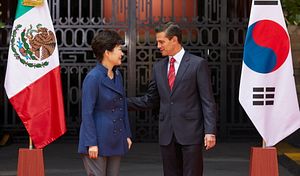So far, 2016 is proving to be an important year for South Korea’s global diplomatic outreach. While network diplomacy has been high on the Ministry of Foreign Affairs’ priorities ever since the launch of the Global Korea strategy in 2008, this push is ever more present in President Park Geun-hye’s summit diplomacy agenda this year. Moreover, compared to the regionalized focus of previous years, the summits held so far are truly global in nature, prioritizing key partners in each continent and emphasizing very specific bilateral goals.
In February and March, the Blue House hosted the Korea-Palestine and Korea-Egypt Summits, while in April Park visited Mexico after attending the Nuclear Security Summit in Washington D.C. Later that month, the Korea-Norway Summit was held in Seoul, followed by the first-ever Korea-Iran Summit in Tehran on May 2. On May 16, the Indonesian president visited Seoul, which will be followed by Park Geun-hye’s tour through three African countries by late May and France in early June.
Common themes for these summits have been economic and cultural cooperation, two of the four administrative goals guiding the Park administration. But more importantly, all of these countries are not only key regional partners for Korea but each represent a specific interest within Korea’s networking efforts. For one thing, Mexico is Korea’s largest trading partner in Latin America, which will only increase if the FTA between them is successfully launched. And it is, along with Indonesia, one of the members of the Korea-led MIKTA middle power caucus. In the Middle East, the Korea-Iran Summit is already seen as a historical milestone, considering that the country only recently “returned” to the international community and that Park’s was the first-ever visit from a Korean president to Iran. As a result, bilateral trade is also expected to triple up to US$18 billion.
In Africa, Park is scheduled to visit Ethiopia, Kenya, and Uganda. The tour will notably feature the first visit by a Korean head of state to the African Union Headquarters in Addis Ababa, and the launch of “Korea Aid,” a new development assistance program focused solely on the African continent. Given that this region is the second largest recipient of Korean ODA and that development assistance is one of the core elements of Korea’s middle power strategy, expectations from these visits are naturally high.
Among these countries, Ethiopia is a particularly special partner for Korea for at least three reasons. First, it was the only African country to contribute to UN-led troops during the Korean War. Second, Ethiopia’s export-led development strategy holds some similarities with the Korean experience, which has further encouraged comprehensive cooperation between both countries. Notably, one of Ethiopia’s newly appointed ministers is a graduate from Korea’s leading public policy think-tank. Lastly, Ethiopia is one of the fastest-growing economies in East Africa, therefore a key emerging market for Korean exports.
In contrast, the state visits to Kenya and Uganda seem to be tainted by a more subtle policy objective. While both countries are important recipients of South Korean aid, they also entertain diplomatic relations with North Korea. Recently, Uganda was even counted among the countries which have failed to implement UN sanctions against North Korea. In such a context, Park’s visits to Kenya and Uganda, just as the general theme of her African tour—development assistance—suggest a calculated display of hard and soft power seeking to strengthen South Korea’s presence in the region.
As for Europe, the Korea-Norway Summit held last April and the upcoming one with France seem to reflect Korea’s growing aspiration to be recognized as a leading actor on global affairs. Accordingly, the agenda between Park and her Norwegian counterpart focused on the UN Sustainable Development Goals and on expanding cooperation on ship-building and maritime affairs— the latter clearly a key issue for these two Arctic Council members. Finally, the Korea-France Summit, the fourth between Presidents Park and Francois Hollande, confirms the deepening nature of French-Korean ties while also being highly symbolic, as it marks the 130th anniversary of bilateral relations.
As for South Korea itself, while on the short-term Park Geun-hye’s busy international schedule may fall prey to criticisms within a grim domestic context, this active networking approach might prove to be important in the long-term, especially so on the economic front. All the more, considering the results of this year’s legislative elections and the upcoming 2017 presidential elections, 2016 is indeed the year for Park to garner as many foreign policy victories as possible.
Anaïs Faure holds a Master in Korean Studies from the Academy of Korean Studies and a Master in Development Policy from the KDI School of Public Policy and Management, both in Korea. Her main research interests include Korea’s foreign policy initiatives, with a focus on Latin America, and Korea’s role in international development.

































